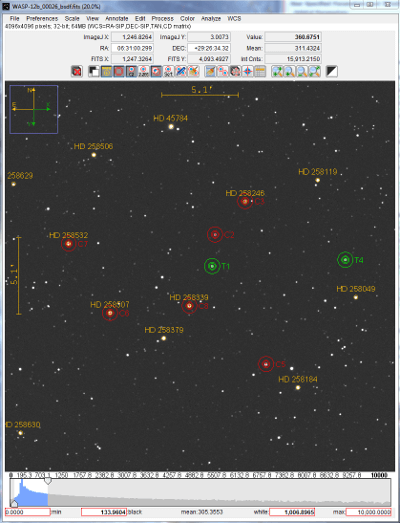AstroImageJ (AIJ) is a simple and powerful tool for astronomical image analysis and precise photometry.
AIJ provides an astronomy specific image display environment and tools for astronomy specific image calibration and data reduction.
Although AIJ maintains the general purpose image processing capabilities of ImageJ, AIJ is streamlined for time-series differential photometry, light curve detrending and fitting, and light curve plotting, especially for applications requiring ultra-precise light curves (e.g., exoplanet transits). AIJ reads and writes standard Flexible Image Transport System (FITS) files, as well as other common image formats, provides FITS header viewing and editing, and is World Coordinate System aware, including an automated interface to the astrometry.net web portal for plate solving images.
AIJ offers research grade image calibration and analysis tools with a GUI driven approach, and easily installed cross-platform compatibility. It enables new users, even at the level of undergraduate student, high school student, or amateur astronomer, to quickly start processing, modeling, and plotting astronomical image data with one tightly integrated software package.
Features include:
- Provides an interactive interface similar to ds9.
- Reads and writes FITS images with standard headers.
- Allows FITS header viewing and editing.
- Plate solves and adds WCS to images seamlessly using the Astrometry.net web interface.
- Displays astronomical coordinates for images with WCS.
- Provides object identification via an embedded SIMBAD interface.
- Aligns image sequences using WCS headers or by using apertures to correlate stars.
- Image calibration including bias, dark, flat, and non-linearity correction with option to run in real-time.
- Interactive time-series differential photometry interface with option to run in real-time.
- Allows comparison star ensemble changes without re-running differential photometry.
- Provides an interactive multi-curve plotting tool streamlined for plotting light curves.
- Includes an interactive light curve fitting interface with simultaneous detrending.
- Allows non-destructive object annotations/labels using FITS header keywords.
- Provides a time and coordinate converter tool with capability to update/enhance FITS header content (AIRMASS, BJD, etc.).
- Exports analyses formatted as spreadsheets.
- Creates color images and with native ImageJ processing power.
- Optionally enter reference star apparent magnitudes to calculate target star magnitudes automatically.
- Optionally create Minor Planet Center (MPC) format for direct submission of data to the MPC.
- Nearby eclipsing binary star identification from expected depth versus light curve RMS table for TESS follow-up.
- Delta-magnitude versus RMS plot.
- Enhanced contrast controls.
- Annotations are retained when placing apertures.
- FITS header search feature.
- Cross-platform support – runs under Linux, Mac OS X, Windows, and other operating systems that support Java.
Website: www.astro.louisville.edu/software/astroimagej
Support: User Guide, Forum
Developer: Karen Collins, John Kielkpof – University of Louisville
License: GNU General Public License v3.0

AstroImageJ is written in Java. Learn Java with our recommended free books and free tutorials.
Return to Astronomy | Return to Astronomical Data Analysis
| Popular series | |
|---|---|
| The largest compilation of the best free and open source software in the universe. Each article is supplied with a legendary ratings chart helping you to make informed decisions. | |
| Hundreds of in-depth reviews offering our unbiased and expert opinion on software. We offer helpful and impartial information. | |
| The Big List of Active Linux Distros is a large compilation of actively developed Linux distributions. | |
| Replace proprietary software with open source alternatives: Google, Microsoft, Apple, Adobe, IBM, Autodesk, Oracle, Atlassian, Corel, Cisco, Intuit, SAS, Progress, Salesforce, and Citrix | |
| Awesome Free Linux Games Tools showcases a series of tools that making gaming on Linux a more pleasurable experience. This is a new series. | |
| Machine Learning explores practical applications of machine learning and deep learning from a Linux perspective. We've written reviews of more than 40 self-hosted apps. All are free and open source. | |
| New to Linux? Read our Linux for Starters series. We start right at the basics and teach you everything you need to know to get started with Linux. | |
| Alternatives to popular CLI tools showcases essential tools that are modern replacements for core Linux utilities. | |
| Essential Linux system tools focuses on small, indispensable utilities, useful for system administrators as well as regular users. | |
| Linux utilities to maximise your productivity. Small, indispensable tools, useful for anyone running a Linux machine. | |
| Surveys popular streaming services from a Linux perspective: Amazon Music Unlimited, Myuzi, Spotify, Deezer, Tidal. | |
| Saving Money with Linux looks at how you can reduce your energy bills running Linux. | |
| Home computers became commonplace in the 1980s. Emulate home computers including the Commodore 64, Amiga, Atari ST, ZX81, Amstrad CPC, and ZX Spectrum. | |
| Now and Then examines how promising open source software fared over the years. It can be a bumpy ride. | |
| Linux at Home looks at a range of home activities where Linux can play its part, making the most of our time at home, keeping active and engaged. | |
| Linux Candy reveals the lighter side of Linux. Have some fun and escape from the daily drudgery. | |
| Getting Started with Docker helps you master Docker, a set of platform as a service products that delivers software in packages called containers. | |
| Best Free Android Apps. We showcase free Android apps that are definitely worth downloading. There's a strict eligibility criteria for inclusion in this series. | |
| These best free books accelerate your learning of every programming language. Learn a new language today! | |
| These free tutorials offer the perfect tonic to our free programming books series. | |
| Linux Around The World showcases usergroups that are relevant to Linux enthusiasts. Great ways to meet up with fellow enthusiasts. | |
| Stars and Stripes is an occasional series looking at the impact of Linux in the USA. | |
